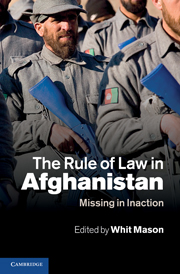Book contents
- Frontmatter
- Contents
- Contributors
- Preface and acknowledgements
- 1 Introduction
- PART I The scope and nature of the problem
- PART II The context
- PART III The political economy of opium
- PART IV Afghan approaches to security and the rule of law
- 9 Engaging traditional justice mechanisms in Afghanistan
- 10 Casualties of myopia
- 11 Land conflict in Afghanistan
- PART V International interventions
- PART VI Kandahar
- PART VII Conclusion
- Index
- References
9 - Engaging traditional justice mechanisms in Afghanistan
State-building opportunity or dangerous liaison?
Published online by Cambridge University Press: 01 June 2011
- Frontmatter
- Contents
- Contributors
- Preface and acknowledgements
- 1 Introduction
- PART I The scope and nature of the problem
- PART II The context
- PART III The political economy of opium
- PART IV Afghan approaches to security and the rule of law
- 9 Engaging traditional justice mechanisms in Afghanistan
- 10 Casualties of myopia
- 11 Land conflict in Afghanistan
- PART V International interventions
- PART VI Kandahar
- PART VII Conclusion
- Index
- References
Summary
Introduction
Afghanistan, like many post-conflict societies, struggles with not only having to rebuild destroyed infrastructure and institutions, but also to come to terms with a legacy of interrupted and inadequate rule of law and justice. Yet the problem does not lie only with the breakdown of a once-functioning formal justice system, but also with the fact that ‘Afghanistan has a rich and layered legal history’ influenced by multiple regime changes (including monarchy, communist/socialist and Islamic) and a complex relationship between different justice systems, including statutory/state, religious (Shari'a) and customary law (Barfield, Nojumi and Thier 2006).
Regardless of what formal legal system was favoured by the ruling government, ‘Afghanistan has often operated under dual systems of governance’ – with formal justice, as much of the Afghan state, never fully reaching into all rural areas, where the majority of the Afghan population reside (Wardak 2004: 326; see also Shahrani 1986, and Wimmer and Schetter 2002). Even before the Afghan wars, the formal legal system, largely restricted to urban areas only, was considered ‘elitist, corrupt and involved in long delays’, and in many ways irrelevant for the rural and illiterate majority (Wardak 2004: 320).
- Type
- Chapter
- Information
- The Rule of Law in AfghanistanMissing in Inaction, pp. 149 - 171Publisher: Cambridge University PressPrint publication year: 2011
References
- 4
- Cited by



